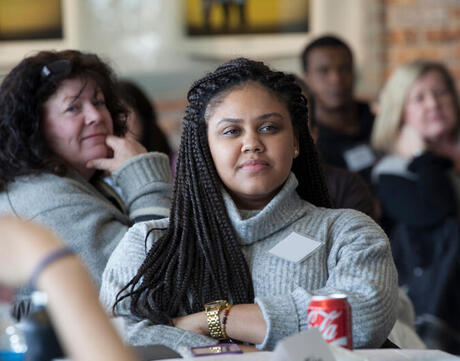
Teaching Coming of Age in a Complex World
July 09, 2024 - July 11, 2024
Virtual
About this event:
Multi-Session
Our multi-session professional learning series are designed for in-depth exploration of themes and topics that help educators strengthen their skills and competencies. Session information is included in the event details.
Instructor-Led
This professional learning event will be led by Facing History staff. When you register, you will receive instructions for how to attend the event.
This event qualifies for Certificate of Completion.
Awarded upon successful completion of the seminar for 15 professional development hours. Requirements for professional development hours vary by state. It is the educator's responsibility to ensure that they are meeting the requirements of their state. If you are an educator based in New York, after taking this course you are eligible for 15 CTLE hours. If you are an educator based in Illinois, after taking this course you are eligible for up to 15 clock hours. If you are an educator based in Illinois, after taking this course you are eligible for up to 15 clock hours. If you are an educator based in Massachusetts, you are eligible for up to 15 PDP hours. Please contact [email protected] to learn more about CTLE hours, clock hours, or PDP hours.
Adolescence is a time when young people are crafting stories about who they are, how they understand the world, and how they fit into society. Literature has the power to inform and transform the way adolescents see themselves and others. Facing History’s approach to teaching Coming-of-Age literature integrates social-emotional learning, civics education, and equity with new research in adolescent development. It is designed to help your students value the complexity of identity, process texts through a critical and ethical lens, and develop their sense of agency.
During this three-day seminar, participants will:
- Practice strategies to foster and sustain student-centered classroom communities.
- Consider the implications of adolescent development research on pedagogy and practice, your sense of purpose as an educator, and your relationships with students.
- Experience a Facing History approach to ELA through hands-on reading, writing, speaking, and listening activities using our collection of Coming-of-Age curriculum resources.
- Develop the mindset and tools to build a Coming-of-Age unit that centers student identity, invites perspective taking and ethical reflection, develops literacy and critical thinking skills, and expands students’ civic capacities and global perspectives.
Taking place over three days, this seminar offers a real-time, interactive online classroom where participants will connect in facilitated whole- and small-group sessions.
Seminar-at-a-Glance Details
Who should take this seminar: 6th- to 12th-grade English language arts and humanities teachers, department chairs, supervisors, and special education teachers.
Cost: There is a non-refundable $25 registration fee due once your application has been accepted. The $350 fee for this seminar has been waived thanks to generous funding from Facing History and Ourselves donors and partner organizations.
Schedule: Tuesday, July 9 – Thursday, July 11, 2024
- Tuesday, July 9: 11 AM–4 PM ET (see in your time zone)
- Wednesday, July 10: 11 AM–4 PM ET (see in your time zone)
- Thursday, July 11: 11 AM–4 PM ET (see in your time zone)
Time Commitment: Approximately 4.5 hours per day (plus breaks). There is a pre-work module to complete before the seminar that is approximately 2 hours long.
Format: Facilitated Zoom meetings with session materials in Canvas.
Accessibility: Facing History is committed to creating and maintaining a welcoming and inclusive educational environment for educators of all abilities. If you have an accessibility need, please contact us.
Certificate of Completion: Awarded upon successful completion of the seminar for 15 professional development hours. Requirements for professional development hours vary by state. It is the educator's responsibility to ensure that they are meeting the requirements of their state. If you are an educator based in New York, after taking this course you are eligible for 15 CTLE hours. If you are an educator based in Illinois, after taking this course you are eligible for up to 15 clock hours. If you are an educator based in Massachusetts, you are eligible for up to 15 PDP hours. Please contact us to learn more about CTLE hours, clock hours, or PDP hours.
_________________________________________________________________
About Coming of Age in a Complex World
Developed for grades 6–12, Coming of Age in a Complex World is a modular collection of curriculum resources supporting the most common instructional formats (Text Sets, Whole-Class Reads, Book Clubs) that can be adapted to meet the needs of your students and goals of your curriculum.
Our program centers students' identities and lived experiences, helping you create space for students to explore complex ideas about self, society, and human behavior.
Our flexible learner-centered approach:
- Diversifies the range of stories that students read;
- Is rooted in the ethical, social, and emotional concerns of adolescence;
- Balances critical analysis with opportunities for students to connect emotionally to characters and themes;
- Helps students to read, write, and think in active ways around authentic and meaningful questions, learning experiences, and assessments;
- Supports a deep exploration of moral dilemmas in literature and students’ lives; and
- Invites students to make real-world connections that explore historical and contemporary contexts in literature.
Students who experience the Coming of Age program will gain critical thinking skills, empathy, civic responsibility, and the belief that they can make a difference in the world.

